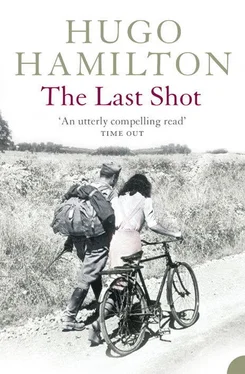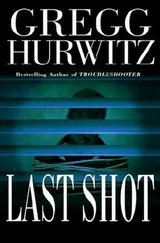His skills were too essential to place him in combat. He became an officer with responsibility for listening to enemy signals. By then he had become familiar with international attitudes on the war. He could understand English, a little Russian and French. His aptitude as a technician saved him from the worst of the war. It did nothing for him now. He felt useless. He felt he wasn’t made for action. This wasn’t his type of thing. He was doing it only for Bertha.
As he ran through the trees he realized how lucky he was to have held on to his gun. At Eger, when he had taken off his uniform, he had rolled up the gun inside it, but had second thoughts and went back to get it. You never know, he thought to himself at the time.
He was less happy about the boots, which were next to useless now. His feet were baking and the boots made far too much noise on the gravel. Even running along the soft, spongy forest floor, they made a thump which vibrated through the limbs of the trees. They would give him away.
For the first time in his life, Franz Kern turned himself into a soldier. All his faculties were alert. He stopped behind a tree. He closed his mouth to listen.
Bertha Sommer remembered something as she ran through the trees. Not something she had time to think about in detail, but a penetrating flash of terror from her childhood. A childhood fear which had never gone away.
When Bertha was seven years old, she had fled from the town warden in Kempen, a man who had repeatedly warned her and her sisters not to play in the fountain on the square in front of their house. The Sommer girls had so much waste paper from their father’s stationery shop that they continued to sail paper boats on the water, clogging up the tiers of the fountain and spilling the water over the cobbled square. The furious town warden, who had to roll up his sleeves to unblock the fountain, regularly complained to the Sommer family, often chasing the girls away with his stick, until one day their grandmother let him into the house to teach them a lesson, personally.
The Sommer girls were terrified of him and hid under the stairs, still holding their shoes, which they had hastily picked up, still trying to stop the youngest girl, Gabi, from giving them away with her sobbing. But they were caught. All of them, except for Bertha, who had hidden behind the coat rack instead. They were marched into the front room under the eyes of the warden while Bertha slipped away, out of the house.
It was the most terrifying memory of her childhood. She spent the whole day running through the town, hiding in the park, until evening, when she returned to the house, exhausted and hungry, ready to give herself up.
It was all happening again.
Except that this time she was not running from nothing. This time, she knew what she was running from, even though she had the feeling she would prefer to give herself up. Her legs were stinging her. She must have run through a bank of nettles. There was also that stone in her shoe which she wanted to get rid of. She was close to a stream by the sound of it. Her sense of direction sent her in a wide sweep back in the direction of the farm. Where was Franz, she kept thinking. She wanted to call him. Realized that he was probably looking for her but that neither of them could afford to call each other.
She hid. She moved on. She stopped again and tried to remove the stone from her shoe. When she heard the men approaching, she turned and ran again. They were much closer than she thought; she had actually caught sight of them running, not their faces, but their legs and shoes underneath at ground level. The forest had a visibility of ten metres. Perhaps twenty metres if you looked out at floor level.
Bertha thought of lying down. Instead she ran hard, at first with her foot only half in her shoe, then losing the shoe and carrying it with her in her hand. The men were behind her. She felt an agonizing dart in her leg which stopped her running. They had thrown something at her. She looked down and saw a short pitchfork which had caught her right leg. She fell.
Before she had a chance to stand up again, she felt the pain in her leg. The pitchfork was underneath her. The two men were standing over her. They wore shabby clothes. They were thin. Unshaven. Their eyes had a mixture of fear and hatred. She tried to speak to them, pleading, begging. They didn’t answer. They stared at her. She should not have spoken to them. She realized that anything she said in German would only attract collective revenge.
Bertha tried to move away, half attempting to get up. It almost seemed comfortable there, on the floor of the forest. She was too weak to stand. One of the men picked up the pitchfork, almost like an act of courtesy, almost as though they had come to help her up again. She stood up on her own, in defiance. It was only when one of the men grabbed her and kissed her that she pushed him away, with sheer hostility.
She walked backwards. It’s never a good idea to walk backwards. She tripped again on the pitchfork, which had been held out. She lost the shoe out of her hand. It hopped upwards as though she was throwing it away, lightheartedly. She screamed just before she was gripped around the neck. A large hand closed over her mouth. She could smell the hand, a musty, animal smell.
Bertha struggled. Hands invaded her body, all over. But she was overpowered with real shock when she saw a man’s sexual organ. The man in front of her had lowered his trousers. It was an erect penis. A dark sac dangling underneath. It was as though she had come across a small, venomous creature in the forest. She could smell it. It filled her with fear.
A hand moved inside her dress. Her breasts fell out of her dress in front. She tried to cover them up again with her hands. As soon as she did that, the hand that seemed to come from nowhere behind her once more began to rush up underneath her dress, between her legs. She had too many vulnerable areas to her body. She possessed too much that men desired. She had the idea that they were dirty hands. She couldn’t prevent her dress from being pulled up and her underwear being pulled down. She felt a sudden urge to urinate and couldn’t help a small jet escaping.
She felt thick fingers burst into her vagina. She felt the same wet hand squeeze her breast. She felt a man begin to suck at her breast. She felt her nipple in his teeth, smelled the grease in his hair. She felt a sweaty hand around her buttocks; fingers bursting into her anus.
The men spoke eagerly to each other. She was excluded. They discussed what to do with her, in a language she could not understand, shouting commands to each other in low voices. She fell backwards. The handle of the pitchfork was placed on her neck to prevent her from getting up. She began to cry convulsively. Certain that she would not survive; thinking she would never get home again. She thought of her sisters.
Everyone has a duty to preserve their own life, to the last. Even if it seems futile. Every time Bertha resisted, she was hit. She felt like giving herself up. It felt as though she was caught so badly that she might as well give in. As if it didn’t matter any more.
One of the men kicked at her legs until they were spread out. He stood on her shins. The pain was unbelievable. At times she tried to raise her head up to see what was happening, like a desperate patient claiming the right to know. But the pitchfork across her neck prevented it. Her hands were being held almost with a bedside manner.
From there on, Bertha didn’t quite follow the order of things. She wasn’t sure what happened first or what came after. She felt nothing but fear until she heard an overriding sound fill the whole forest around her; a sound that brought back the whole war all over again. A shot, the clear sound of a gunshot, ripped through the trees, echoing and whistling in her ears. Birds scattered. Wood pigeons and turtledoves flapped away across the top of the forest, like returning distant gunfire.
Читать дальше
Конец ознакомительного отрывка
Купить книгу












